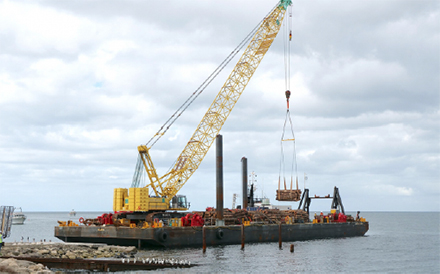SA’s Primary Industries Minister David Basham will send staff to Kangaroo Island to assess what timber stocks can be salvaged in the wake of a company’s “crazy” decision to burn thousands of hectares of plantation forests – a move prompted by the Planning Minister axing its proposed timber port. Sources: InDaily, ABC News, Timberbiz
The State Government says it is most interested in salvaging the 3000ha of pine trees on Kangaroo Island that are proposed to be razed.
Listed company Kangaroo Island Plantation Timbers (KIPT) announced it would walk away from the forestry industry following the Government’s decision to reject its plans for a port on the island’s north coast.
It instead plans to revert 18,6967 hectares of its land to agriculture – a decision that will involve uprooting and burning about 14,500 hectares of pine and blue gum plantations.
The move comes at a time when severe structural timber shortages are threatening to derail South Australia’s building boom.
Some of the estimated 4.5 million tonnes of timber damaged in the Kangaroo Island fires that began in December 2019 had been earmarked for use as structural timber for the building industry but shipping it off the island in an economically viable way is yet to be achieved.
While small amounts of timber have been trucked across Backstairs Passage on the SeaLink ferry from Penneshaw to Cape Jervis, larger barging proposals from Kingscote and American River have faced some community opposition and approval delays.
Primary Industries Minister David Basham told ABC Radio Adelaide his department was working with industry on ways to salvage as much timber as possible before it was pushed over and torched.
“It’s crazy and it’s something we’re working strongly towards to make sure it doesn’t happen,” he said. “They are open to options for getting timber off the island still, they just want it off really quickly.
“We know there will be some timber that has been so badly damaged that it has no economic value even if we could get all the timber off easily, so we know that is likely to have to be burnt.”
KIPT has about 14,500 hectares of plantations, about 80% hardwood (blue gum) and 20% softwood pine, which is used to produce structural timber. This represents close to 10% of the state’s plantations.
But about 95% of it was damaged in the Kangaroo Island fires.
The company has received more than $60 million in insurance payout following the fires and has since been in a race against time to salvage the timber and ship it off the island before it rots.
Minister Basham said he was most interested in the 3000ha of pine plantation, which could potentially be salvaged for structural timber.
KIPT has estimated this is enough to build 10,000 homes, which is about the number of new homes built in SA each year.
“We need to go over and see exactly what’s there and we are organising for that to happen almost immediately,” Minister Basham said.
“Pushing the trees over is a faster and quicker way of bringing it back to production but as a publicly listed company, they need to consider all proposals put to them.
“If we can put a case to them that there is going to be a return for them then as directors of a public listed company, they have to consider that.
“The long-term solution for timber to be an ongoing industry on the island did require, in their eyes, a port to be built.
“For the short-term option to get timber off, nothing has changed.”
KIPT has said the pushing over and piling of timber would likely begin soon with burning to take place between late April and October, outside of fire danger season.
A long-time opponent of the Smith Bay port and former Liberal state MP, Kangaroo Island Mayor Michael Pengilly yesterday took to social media to hail the KIPT decision to axe its plantations as “a great rethink”.
Mr Pengilly told ABC News that he welcomed the government’s decision to reject the port application and KIPT’s announcement that it would be converting forestry to farming.
“High-rainfall country is in demand and to turn it back into agricultural production for food and fibre for the world … it’s the best possible outcome for the island,” Cr Pengilly said.
He said he wanted council to now look at banning all new forestry developments on the island.
“Council will need to consider getting the development plan amended so that commercial forestry can never be an approved industry on the Island,” Cr Pengilly said.








